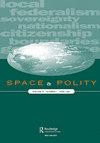复仇主义的“自然”和21世纪的种族灭绝
IF 1.1
Q2 GEOGRAPHY
引用次数: 0
摘要
自然界正在通过新的病原体、抗生素耐药微生物和害虫侵扰来应对人为变化。这种复苏是对人类改变的环境进行非人类再占有和改造的一部分。在本评论中,我们认为这种“复仇主义”催生了两种新的种族灭绝形式:对非人类动物的先发制人的大规模屠杀,以及通过COVID-19和其他大流行病表达的对人类的灭绝;这些形式将成为21世纪大规模屠杀的典型。本文章由计算机程序翻译,如有差异,请以英文原文为准。
Revanchist ‘nature’ and 21st century genocide
ABSTRACT The natural world is responding to anthropogenic change through novel pathogens, antibiotic-resistant microbes, and pest infestations. This resurgence is part of a non-human reappropriation and transformation of human-altered environments. In this commentary, we argue that this ‘revanchism’ has prompted two new forms of genocide: the pre-emptive mass slaughter of non-human animals, and the annihilation of humans as expressed through COVID-19 and other pandemics; forms that will become exemplars for mass murder in the twenty-first century.
求助全文
通过发布文献求助,成功后即可免费获取论文全文。
去求助
来源期刊

SPACE AND POLITY
GEOGRAPHY-
CiteScore
4.10
自引率
4.20%
发文量
19
期刊介绍:
Space & Polity is a fully refereed scholarly international journal devoted to the theoretical and empirical understanding of the changing relationships between the state, and regional and local forms of governance. The journal provides a forum aimed particularly at bringing together social scientists currently working in a variety of disciplines, including geography, political science, sociology, economics, anthropology and development studies and who have a common interest in the relationships between space, place and politics in less developed as well as the advanced economies.
 求助内容:
求助内容: 应助结果提醒方式:
应助结果提醒方式:


